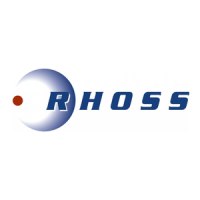ELECTRONIC CONTROL FOR TERMINAL UNITS
22
II.4 INSTRUCTIONS FOR START-UP
IMPORTANT!
Machine start-up or commissioning (where
applicable) must be carried out by skilled
personnel, qualified to work on this type of product.
DANGER!
Before starting up, make sure that the installation
and electrical connections have been carried out in
compliance with the instructions in this manual.
Also make sure that there are no unauthorised
persons in the vicinity of the machine during the
above operations.
II.4.1 PRELIMINARY CHECKS BEFORE START-UP
Before starting up the unit:
1. the accessory is positioned correctly;
2. the electrical connections are correct;
3. the screws holding the cables are tightened well;
4. the supply voltage is as required;
5. the absorption of the unit is correct and does not exceed the
maximum allowed.
It is advisable to run the unit at maximum speed for several hours.
II.4.2 DECOMMISSIONING
IMPORTANT!
If the unit is not used during the winter period, the
water contained in the system may freeze.
When the machine is not used for long periods of time, it must be
disconnected from the mains by opening the mains switch of the
system, set in place by the installer.
II.4.3 RESTART AFTER PROLONGED SHUTDOWN
Before restarting it is recommended to operate the unit at maximum
speed for a few hours.
II.5 INSTRUCTIONS FOR MAINTENANCE
DANGER!
Always act on the main switch to isolate the unit
from the mains before any maintenance operation
on it, even if purely inspective. Make sure that no
one supplies power to the machine accidentally;
lock the master switch in zero position.
DANGER!
Maintenance work must be performed by expert
technicians, qualified to work on air conditioning
and refrigeration products. Use suitable work
gloves.
DANGER!
It is forbidden to introduce pointed objects through
the air intake / delivery grids.
II.6 INDICATIONS FOR DISMANTLING THE UNIT
SAFEGUARD THE ENVIRONMENT!
RHOSS S.p.A. has always cared about protecting
the environment.
It is important that the following indications are
scrupulously followed by those who will dismantle
the unit.
The unit must only be dismantled by a firm authorised for the disposal
of scrap machinery/products.
The unit as a whole is composed of materials considered as secondary
raw materials and the following conditions must be observed:
If the system is added with antifreeze liquid, the latter must not be
discharged freely, because it is polluting.
It must be collected and suitably disposed of;
The electronic components (electrolytic capacitors) are to be
considered special waste, as such must be delivered to an institution
authorized to collect;
The insulation material of the pipes, in expanded polyurethane foam,
in cross-linked polyethylene foam, in polyurethane foam and the sound-
absorbing sponge that covers the panels, must be removed and treated
as municipal waste.

